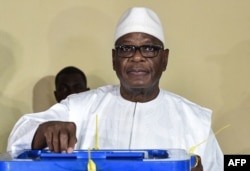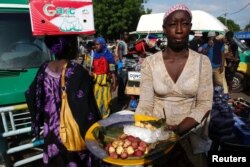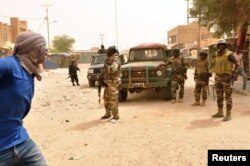In winning a second term as Mali's president on Thursday, Ibrahim Boubacar Keita has another chance to tackle challenges ranging from curbing insecurity to improving the legal system and economy, analysts say.
The 73-year-old Keita garnered 67 percent of the votes in a runoff election against competitor Soumaila Cisse. Threats of violence by jihadist militants held the runoff vote to a dismal 34 percent, and ethnic violence closed polls in the initial round of balloting July 29 – despite efforts by the government and international forces to stabilize the country three years after signing a peace deal.
In Keita's next five-year term, the president faces extending state authority into parts of the West African country where there’s still inter-communal violence or fighting between armed groups, observers say. They're also calling for reforms to a corrupt and inefficient court system, and for implementing peace accords that require disarming fighters and integrating some of them into the military.
The accords, signed in the capital city of Bamako in June 2015, aimed to end fighting between the government and armed groups in the north, including some linked to international terrorism.
The fighting and instability have created humanitarian concerns, displacing more than 62,000 people in Mali and prompting nearly 140,000 others to seek refuge in neighboring countries. Those conditions also have throttled a once-thriving tourism sector and driven away private investment.
Economic needs
Half of the West African country's 17 million-plus people live on less than U.S. $1.25 a day.
And though the agriculture-based economy grew around 5 percent a year during Keita’s first term, the benefits of that growth hasn't reached rural areas. Food insecurity is widespread.
"The gains are regionally concentrated and within a bureaucratic government and business class," said Jonathan Sears, an assistant professor of international development studies at Menno Simons College in Winnipeg, Canada.
The beneficiaries generally include "a particular set of actors … connected to agriculture, mining, energy and real estate," Sears said. "Also, most Malians live in the south or the center, so the gains are concentrated in opportunity centers around Bamako, Sikasso, Segou [and other cities]… There’s a wide swath of people not seeing that growth."
Sears and other analysts say the public lacks confidence in the government’s ability to provide security and improve living standards.
Polls show that large majorities of Malians disapprove of government management of the economy, and of its efforts to boost living standards for the poor.
Issues with inequity
Arthur Boutellis, a senior adviser with the International Peace Institute in New York, sees a gulf between the governing class and the governed, the state and its citizens.
In providing basic services, security and justice, "the main challenge of the government and the president will be to try to restore trust in the state," said Boutellis, who also has worked in various UN missions, including in Mali. "It’s basically demonstrating that it can provide services to people."
Conditions on the ground complicate that goal.
Government forces have failed to halt inter-community clashes in the central region – and to provide the security essential for reconciliation, social support and economic growth.
"The problem is they haven’t been able to expand their [military] presence and have faced setbacks," Boutellis said. "The agents of the state – administrators, justices and so on – have folded back to only the main urban centers … and have abandoned some of the smaller localities. …
"There is a national plan for central Mali, and a support plan by the European Union as well," he added. "But the problem is: How do you implement them without effective security forces that are also accepted by the local population?"
In the 2015 peace accords, the signatory armed groups and the government agreed to demobilize and disarm ex-rebels, some of whom would join Mali’s military.
As an interim measure, the signatories agreed to establish joint patrols combining the Malian defense and security forces and some of the armed groups.
Critics complain that the government is dragging its feet. Officials blame the situation on continued violence by armed groups, a lack of cooperation by some separatist forces in the north and by donors who have failed to fulfill their pledges.
Countering corruption
The government also must tackle corruption and impunity, analysts say.
One area needing reform is the court system, said Richard Reeve, chief executive of the London-based Oxford Research Group. The independent organization specializes in new approaches to security and building peace.
Reeve said political and economic elites have corrupted Mali's justice system. He recommended "bringing in less formal judicial actors," such as chiefs and traditional authorities, to work "within the statutory court system." He also urged "working with paralegals, who are much cheaper and easier to train than lawyers, judges and magistrates. That’s been tried successfully in post-conflict countries like Sierra Leone and Liberia."
The government also could aid employment and small-scale development in farming, small trading and mechanics shops, Reeve said. He called for infrastructure such as feeder roads and water supplies, as well as administrative governance promoting community safety.
More needs to be done to foster reconciliation between ethnic and community groups in Mali's troubled central region, Reeve stressed.
He suggested increased political participation – especially for youth and women – to make government more responsive and effective, promote reconciliation and reduce the appeal of armed groups.







